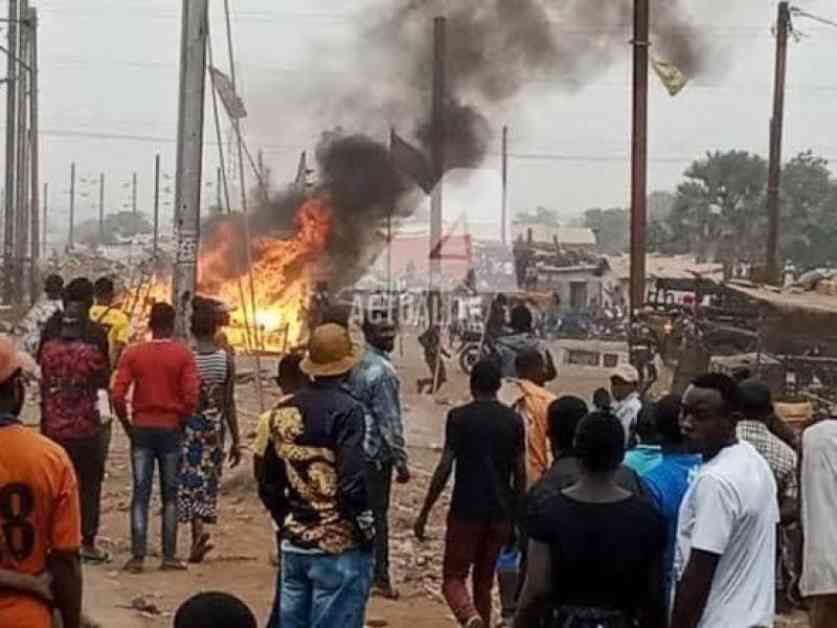Summary: In Kolwezi, the capital of the Lualaba province, violent clashes erupted between law enforcement and artisanal miners on Monday, March 3, 2025. The confrontations followed the demolition of several mineral purchase depots near the Kamoto Copper Company (KCC) the previous week, with authorities aiming to curb illegal mineral trafficking, particularly of cobalt. This crackdown has led to ongoing tensions and disruptions in the region, impacting local socio-economic activities.
Kolwezi: The Clash Between Law Enforcement and Artisanal Miners
Kolwezi, a bustling city in the heart of the Lualaba province, found itself engulfed in turmoil on Monday, March 3. The streets of the Tshamundenda neighborhood, on the outskirts of Kolwezi, became a battleground where law enforcement faced off against artisanal miners in a violent clash. These skirmishes erupted in the aftermath of the demolition of multiple mineral storage facilities situated in a residential area near the Kamoto Copper Company (KCC), a move orchestrated by provincial authorities to combat the illicit mineral trade, notably cobalt, which is tightly regulated in the Democratic Republic of Congo.
Philippe Roy Kaumba, the provincial Minister of Interior and Security, had defended the operation, citing a surge in mineral thefts within the KCC concession. He argued that these depots facilitated the illegal commercialization of minerals, often extracted outside official channels. With the DRC holding over 70% of global cobalt reserves, stringent regulations govern the extraction and trade of this vital ore, overseen by the regulatory authority for strategic mineral markets. This framework ensures only compliant cooperatives and companies engage in cobalt activities.
Despite these efforts, the region grapples with unrest. “Since Monday morning, artisanal miners have protested the closure of the Tshiala depots. They want to continue mining for their survival. They are at a loss. Law enforcement attempted to restore order, but to no avail. It spiraled into chaos. The miners set tires ablaze in the streets, making Luilu a challenging place,” shared a local resident. The clash underscores the struggle between desperate artisanal miners, many lacking permits, seeking to exploit mineral deposits informally and the authorities and mining companies enforcing regulations.
In various mining towns across Lualaba, these regulations are perceived as hindrances to the economic survival of local communities. For numerous unemployed youth, artisanal cobalt mining remains the sole income source, despite the risks and government restrictions. Consequently, the ongoing clashes have paralyzed all activities in parts of Kolwezi, with roadblocks disrupting traffic between the city and Luilu. Law enforcement endeavors to restore order, yet the situation remains precarious.
Expert Insight: The Impact of Artisanal Mining on Local Communities
As tensions escalate in Kolwezi, experts emphasize the complexities surrounding artisanal mining and its broader implications. Dr. Sarah Mbenga, a renowned geologist specializing in African mineral resources, sheds light on the challenges faced by artisanal miners in the DRC. “The artisanal mining sector plays a crucial role in the Congolese economy, providing livelihoods for many vulnerable communities. However, the lack of formalization and regulation often leads to conflicts, environmental degradation, and human rights abuses. Balancing the economic benefits with sustainable practices is essential for the long-term well-being of both miners and the environment.”
The situation in Kolwezi serves as a microcosm of the larger issues plaguing the artisanal mining sector in the DRC, highlighting the urgent need for comprehensive policies that safeguard both economic interests and environmental sustainability. As the clashes persist, the residents of Kolwezi grapple with uncertainty, caught in the crossfire of competing interests and aspirations. The road ahead remains fraught with challenges, demanding a delicate balance between economic imperatives and ethical considerations.

















